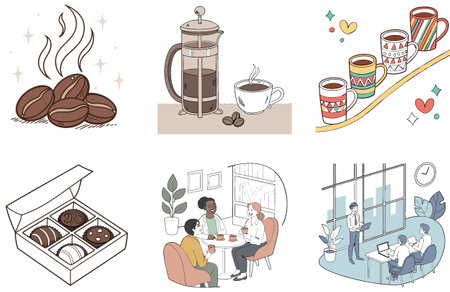Introduction to Decaf Coffee in the UK
There’s something truly comforting about a warm cup of coffee, especially here in the UK where sharing a brew is woven into the fabric of our daily lives. Whether it’s catching up with friends after the school run or enjoying a quiet moment before the family wakes, coffee holds a special place in many British homes. In recent years, however, more and more families are choosing decaf options—seeking out that familiar taste and ritual, but without the jitters or sleepless nights often brought on by caffeine. This shift isn’t just a passing trend; it reflects a growing awareness of wellbeing and the desire for healthier alternatives that still allow us to savour life’s little pleasures. From busy mums wanting to unwind in the evening, to grandparents who simply love their afternoon cuppa, decaf coffee is becoming an essential part of our kitchen cupboards. As interest grows, so too does curiosity about how decaf is made—especially when it comes to natural, gentle processes like Swiss Water and CO2 methods now available in the UK market.
2. The Swiss Water Process: Pure and Natural Decaf
When it comes to enjoying a lovely cup of coffee without the jitters, especially for us mums who are mindful of our health and sleep, the Swiss Water Process has become a trusted favourite across the UK. This gentle decaffeination method stands out because it uses only water, temperature, and time – absolutely no chemicals in sight! Let me walk you through how it works and why its a top pick for families wanting to savour their daily brew without worry.
How Does the Swiss Water Process Work?
The Swiss Water Process starts by soaking green coffee beans in pure, filtered water. This draws out the caffeine along with some of the coffee’s flavour compounds. The resulting solution, called Green Coffee Extract (GCE), is then used to soak fresh batches of beans. Thanks to clever science, caffeine naturally migrates from the beans into the GCE, but all those delicious coffee flavours remain locked in the bean. After several hours – and lots of careful monitoring – you’re left with decaffeinated beans that are rich in taste but free from harsh chemicals or residues.
The Swiss Water Method at a Glance
| Step | Description |
|---|---|
| Soaking | Green beans soaked in pure water to remove caffeine |
| Extraction | Caffeine and flavour compounds dissolve into water |
| Filtering | Caffeine is filtered out; flavour-rich GCE remains |
| Re-soaking | Fresh beans are soaked in GCE to remove caffeine but keep flavours intact |
Why UK Mums Love It
For health-conscious parents, the Swiss Water Process is a dream come true. There’s no need to worry about chemical residues lingering in your morning cuppa. This method also preserves those lovely coffee aromas and subtle notes we adore, making it perfect for anyone who wants to enjoy coffee’s full character without compromise.
Benefits for Families
- No chemicals or solvents used – just water!
- Lowers risk of unwanted side effects from residual chemicals
- Keeps natural flavours intact for a satisfying taste
A Beloved Choice in the UK Market
Across Britain, more independent roasters and supermarkets are championing Swiss Water decaf as their go-to option for discerning customers. Whether you’re preparing an afternoon treat for friends or simply want to unwind after bedtime stories, this method delivers on both taste and peace of mind. It’s no wonder so many UK households are making the switch – once you try a truly clean cup, there’s really no going back!

3. CO2 Decaffeination: Science Meets Flavour
When it comes to finding the perfect cup of decaf that still tastes just like the real thing, British mums (like me!) know how important it is to keep those comforting flavours intact. Enter the CO2 decaffeination method, an innovative process that’s gaining popularity across the UK for its impressive blend of science and taste preservation. This method uses pressurised carbon dioxide—yes, the very same gas we exhale—to gently remove caffeine from coffee beans while leaving those rich, familiar notes we all love untouched.
The safety of the CO2 process is one of its biggest selling points for families who want to serve up decaf brews at home, without any worry about harsh chemicals lingering in their morning cups. The process works by soaking green coffee beans in water and then using CO2 under high pressure to selectively extract the caffeine. What’s wonderful is that this technique doesn’t strip away all those essential oils and flavour compounds that make coffee so delightful and warming—perfect for a cosy afternoon in a British kitchen.
For busy households trying to balance health with pleasure, CO2 decaffeinated coffee offers efficiency too: it can be done on a large scale with minimal waste, making it a responsible choice for eco-conscious families. More UK brands are now embracing this technology, recognising our collective desire for safer, tastier decaf options. If you’ve ever hesitated over switching to decaf because you’re worried about losing out on that authentic coffee taste, rest assured—the CO2 method is here to keep your beloved brew as inviting as ever.
4. Other Decaf Methods on the UK Market
When it comes to enjoying a comforting cup of tea or coffee with the family, many mums in the UK are keen to understand exactly how their favourite brews have been decaffeinated. Beyond popular Swiss Water and CO2 processes, the market also offers traditional solvent-based methods that are still widely used. Let’s explore these options together, so you can make the best choice for your loved ones during those precious kitchen table moments.
The Solvent-Based Process: What Every Mum Should Know
Solvent-based decaffeination uses chemicals such as methylene chloride or ethyl acetate to extract caffeine from beans or leaves. While this might sound a bit scientific, both methods are strictly regulated in the UK and Europe to ensure no harmful residues remain. Some mums may feel uneasy about chemical processes, while others appreciate that the final product is tested for safety before reaching our shops. It’s all about balancing peace of mind with personal preference.
Comparing Decaf Methods at a Glance
| Decaf Method | Main Feature | Pros | Cons | Popular With |
|---|---|---|---|---|
| Swiss Water | Uses only water and filtration | No chemicals, preserves flavour well | Slightly pricier, limited availability | Eco-conscious families |
| CO2 Process | Pressurised carbon dioxide extracts caffeine | No chemical residue, good for large batches | Specialist equipment needed, less artisanal choice | Coffee enthusiasts seeking purity |
| Solvent-Based (Methylene Chloride/Ethyl Acetate) | Chemicals dissolve caffeine; beans rinsed after | Cost-effective, widely available brands | Some mums worry about chemicals despite regulations | Mainstream supermarket shoppers |
| Natural Ethyl Acetate (from fruit) | Uses naturally-derived solvent from fruit sugars | Touted as ‘natural’, appealing story for kids! | Still a solvent process, some debate on ‘natural’ label | Mums looking for a middle ground option |
A Thoughtful Choice for Every Family Occasion
Whether you’re brewing a pot for Sunday breakfast or sharing a cuppa during homework time, knowing the differences between decaf methods can help you choose what feels right for your family. Some mothers prefer the peace of mind that comes with chemical-free methods like Swiss Water, while others trust mainstream brands using solvent techniques—especially since safety standards here in the UK are so reassuringly high. Whichever you pick, it’s lovely to know you’re making an informed decision for those treasured family moments around the kettle.
5. Taste Test: How Do These Methods Stack Up?
If you’re anything like me, there’s nothing quite as comforting as a soothing cup of coffee—especially when it’s decaf and I can enjoy it at any hour without worrying about being up all night! With so many decaf methods available in the UK, from Swiss Water to CO2 and beyond, it’s only natural to wonder how these processes actually affect the taste, aroma, and overall quality of your brew.
The Swiss Water Experience
Swiss Water is a favourite for many British households seeking a cleaner, more natural brew. Since this process uses just water (no chemicals!), the resulting coffee tends to have a smooth, mellow flavour with subtle chocolatey or nutty notes. The aroma remains gentle yet inviting, making it perfect for those moments when you want your kitchen to smell just like your favourite café. It’s especially lovely if you’re sensitive to harsh tastes or simply want something easy on the palate.
CO2 Decaf: Bright and Lively
CO2-processed decaf coffees have been gaining popularity in trendy London coffee shops for good reason. This method preserves much of the bean’s original character, resulting in a brew that can be surprisingly vibrant with fruity or floral undertones. If you love a brighter cup or enjoy exploring single-origin beans, CO2 decaf might be your new go-to for an afternoon pick-me-up while the rain taps gently at the window.
Chemical Methods: A Classic British Cuppa?
Though some traditionalists still favour solvent-based methods for their affordability and accessibility across UK supermarkets, you’ll often notice a slightly flatter flavour profile compared to Swiss Water or CO2 options. However, they do make a reliable everyday brew—perfect for dunking a biscuit or two during your tea break!
Tips for Choosing Your Cosy Decaf
When selecting decaf coffee for home, always check the label to see which method was used—many ethical UK brands proudly display this information. For a gentle, family-friendly option (and fewer nasties), try Swiss Water. If you’re an adventurous soul who loves robust flavours, look out for specialty roasters offering CO2 decafs. And never underestimate the joy of sampling different blends until you find one that truly warms your heart—and your mug! Whatever you choose, remember that every cup can be a little moment of comfort in your busy day.
6. Where to Find the Best Decaf in the UK
If you’re keen to embrace all the benefits of decaffeinated coffee—without compromising on flavour or quality—the UK is home to a growing range of options, perfect for busy mums and families who want their cuppa without the caffeine jitters. Here are some warm, motherly tips for discovering top-quality decaf beans and cafes around Britain.
Finding Trustworthy British Roasters
Start your journey by seeking out local, independent roasters who specialise in alternative decaffeination methods like Swiss Water or CO2. Brands such as Union Hand-Roasted Coffee, Origin Coffee, and Caravan Coffee Roasters have earned glowing reputations for their commitment to sustainable sourcing and high-quality decaf options. These trusted names often clearly label their decaf processes, so you know exactly what’s in your cup—a reassuring touch for any parent.
Family-Friendly Cafés Worth Visiting
If you love the ritual of popping out for a coffee with little ones in tow, many family-friendly cafés across the UK now proudly serve premium decaf that’s just as tasty as their regular brews. Look for cafés that advertise Swiss Water Process or CO2 decaf on their menus; it’s a sign they care about both flavour and health. Some lovely spots like Gail’s Bakery and Costa Coffee (with branches up and down the country) offer reliable, well-crafted decaf suitable for a comforting pit stop after school runs or weekend adventures.
Sourcing Beans for Home Brewing
For those cosy mornings at home, several online retailers make it easy to order freshly roasted, ethically sourced decaf beans straight to your door. Websites like Hasbean, Rave Coffee, and Pact Coffee feature a range of alternative process decafs—simply check their product descriptions for details on how each batch has been decaffeinated.
A Warm Mum’s Recommendation
No matter where you’re based—from London’s bustling streets to the rolling hills of Yorkshire—you’ll find British brands dedicated to offering delicious, safe, and family-friendly decaf choices. Try different roasters until you find one that delights your taste buds; perhaps even involve your children in a gentle “taste test” at home! With so many thoughtful options available, enjoying a delicious cup of coffee—day or night—has never been easier or more reassuring for UK families.


